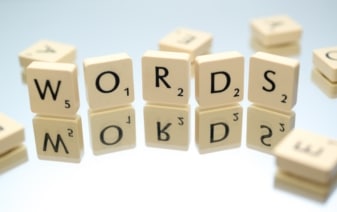When it comes to learning a new language, words, expressions and idioms are a very important feature to start with. It is also very exciting and interesting as you can always compare them to your own language or other languages you know. The English language is one of the richest regarding vocabulary, so it can often be overwhelming and beginners don’t always know where to start from. In today’s new post, GlobalExam will show you how you can learn English vocabulary with General English, our new program, quickly and efficiently!
Now without further ado, let’s get into it!
Vocabulary 101: The most common expressions in English
In this first section, you will find the most common expressions there is to know if you want to start learning English:
| Word/expression | Example |
|---|---|
| Hello / Hi (fam.) | Hello! |
| How are you? | Hi! How are you today? |
| Thank you / thanks (fam) | Thank you for this tip. |
| You’re welcome | It’s nothing, you’re welcome! |
| Goodbye | Goodbye. I’m going out. |
| See you later | Goodbye. See you later! |
| Where are you from? | Where are you from? I’m from Canada. |
| When is your birthday? | When is your birthday? It’s on the 8th of November. |
| Do you speak English? | Do you speak English? Yes, but I am learning! |
| Where do you live? | Where do you live? I live in London |

Vocabulary sheet n°1: The English numbers
Let’s learn about English numbers, shall we? Here you will find both letter and number forms:
| 0 | zero |
|---|---|
| 1 | one |
| 2 | two |
| 3 | three |
| 4 | four |
| 5 | five |
| 6 | six |
| 7 | seven |
| 8 | eight |
| 9 | nine |
| 10 | ten |
| 11 | eleven |
| 12 | twelve |
| 13 | thirteen |
| 14 | fourteen |
| 15 | fifteen |
| 16 | sixteen |
| 17 | seventeen |
| 18 | eighteen |
| 19 | nineteen |
| 20 | twenty |
| 30 | thirty |
| 40 | fourty |
| 50 | fifty |
| 60 | sixty |
| 70 | seventy |
| 80 | eighty |
| 90 | ninety |
| 100 | one hundred |
| 1.000 | one thousand |
Vocabulary sheet n°2: Learn animal names in English
This section will teach you about animal names in english, along with an example:
| Word/expression | Example |
|---|---|
| a cat | My cat is adorable. |
| a dog | My dog is smart. |
| a rabbit | My sister’s rabbit is fluffy. |
| a fish | My fish is small and red. |
| a horse | I have a white horse. He is fast! |
| a cow | Cows give milk. |
| a pig | Pigs are very smart. |
| a lion | Most lions live in savanna. |
| an elephant | Elephants are huge. |
| a mouse | Mickey is a mouse. |
| a turtle | My grandmother has a turtle. It is very slow! |
| a snake | I love snakes, they’re long and smooth. |
| a spider | Some spiders can be dangerous. |
| a honeybee | Honeybees produce honey and we have to protect them. |
| a shark | A lot of people are afraid of sharks. |
| a whale | Whales are even bigger than elephants! |
| a bird | Birds fly in the sky. |
| a butterfly | Butterflies are colourful and pretty. |
| a wolf | Wolves are often seen in forests. |
Vocabulary sheet n°3: What time is it? How to tell the time in English
Learning how to say what time it is on the clock can be quite tricky for new learners.
But don’t worry, it’s in fact very simple and here is a quick and easy guide that will help you tell the time in no time!
When it’s a round number (12, 1, 8 etc.) we say “it’s… o’clock”:
It’s 12 o’clock.
It’s 8 o’clock.
On the first half of the clock, we would use “past” to indicate the minutes right after the hour.
It’s five past ten (10:05)
It’s a quarter past six (06:15)
It’s half past eight (08:30)
On the second half of the clock, we would use “to” instead of “past”
It’s twenty to ten (10:40)
It’s a quarter to six (06:45)
It’s five to eight (08:55)
That’s it!
But there are a few things to remember in addition to this:
- We use at + time when giving the time of an event.
The party starts at 8 o’clock. The lesson finishes at half past five.
- We use it is (it’s) to answer a question about time:
What time is it? It’s a quarter to one.
- The English system doesn’t work on a 24 hour basis like a lot of other countries. Instead, it works on a 12 hours basis.
So how can you differentiate 8 (in the morning) or 8 (in the afternoon)?
Well, English speakers simply use “am” or “pm” to indicate if they talk about night or day.
→ AM (ante meridiem) will be used from midnight to 11 in the morning.
8am would be 08:00
→ PM (post meridiem) will be used from noon to 11 in the evening.
8pm would be 20:00
Vocabulary sheet n°4: Learn body parts in English
Here is a list of important words to know related to the human body:
| Word/expression | Example |
|---|---|
| head | You only have one head. |
| hair | I have blond hair. |
| teeth | My teeth are white. |
| eyes | My eyes are green. |
| mouth | There are teeth in my mouth. |
| nose | The nose is in the middle of the face. |
| ears | My ears like music. |
| neck | My neck supports my head. |
| hands | We have two hands. |
| arms | My arms have hands. |
| fingers | I have ten fingers. |
| legs | I have two legs. |
| feet | I don’t like shoes on my feet. |
| body | My body is tanned. |
| nails | My nails are painted. |
Vocabulary sheet n°5: Learn English clothing
Here are some vocabulary words related to clothes:
| Word/expression | Example |
|---|---|
| a dress | My dress is blue and perfect for the summer. |
| a tie | My tie is too tight. |
| trousers | My trousers are black. |
| a jacket | I like my jacket, it fits with my dress. |
| a top | My top is white. |
| a skirt | My skirt is long and perfect for autumn. |
| a t-shirt | Your t-shirt is really nice! |
| a jumper | My jumper is warm and comfy. |
| socks | I always lose my socks. |
| underwear | I like pretty underwear. |
| a belt | I forgot to put a belt on my trousers. |
| shoes | I love shoes. |
| trainers | I take my trainers to go running. |
| gloves | Gloves are nice to keep your hands warm. |
| hat | My hat keeps me from sunburns. |
Why is it so important and useful to learn vocabulary?
Each language (including your own) has its own set of words and idioms. Learning about a language’s vocabulary will allow you to open yourself to its culture and people. A rich vocabulary not only improves the way you communicate but also the way you think. Language skills such as writing, reading, listening etc can only be expanded and improved if you learn more vocabulary words and expressions. Your grammar learning skills will also be developped thanks to this!
Learning idioms can also help you get further into the language culture as it often reflects a certain part of it or has undoubtedly a curious meaning behind it. A large vocabulary also makes learning a new language easier: lessons and concepts are easier to understand and you can easily manipulate the words in order to practice and memorize them. In any case, vocabulary is one of the foundations of a language that you should not overlook!
The best methods to help you learn vocabulary words
There are so many ways to learn English ! That applies to vocabulary words as well. Did you know that there were millions of words within the English language? But don’t worry, you don’t have to learn every single one. On average, English speakers know about 20.000 words anyway. So how can you possibly memorize so many new words? Follow this mini guide about the best methods to help you learn new vocabulary and it won’t be a problem:
→ Understanding.
To learn a new word, you have to understand what it means. So be sure to find an equivalent in your own language.
→ Don’t translate.
It will be easier for you to memorize words if you don’t just translate the word and forget about it. When you see a new word, the best method is to look for an image or a visual representation for it on the internet. This way, you will associate the word with its meaning as well as an accurate visual representation.
→ Choose interesting themes.
Whether it’s daily life vocabulary words or themes that you like, try to focus first on words you know you will need and be interested in. They can be about your job or your hobbies, passions etc.
→ Repetition is key.
The more you repeat something, the easier it gets to memorize it. So don’t be afraid to repeat those new words over and over again, at different times of the day, several days apart. Repetition makes perfect.

Our best tips to learn new words fast and efficiently
Here are 3 tips to learn new words efficiently:
Tip#1: Keep track of your vocabulary, keep a notebook with you
Anytime you come across a new vocabulary word, write it down in a notebook. This will help you a lot with your spelling skills and will allow you to improve your vocabulary building skills. Write down the word, an example in a sentence and/or a picture to remember what it means (no direct translations!) and look for synonyms.
Tip#2: Vary activities
We saw that repetition was a very important part of the learning process and the more varied your activities are, the easier for you it will be to memorize these new words. Pick activities related to the theme or words you want to learn in order to see these words repeated several times in context. (watch a documentary, listen to a song or a podcast, play a game etc.)
Tip#3: Don’t forget about pronunciation.
It is very important that you practice pronunciation too. If you know a thousand words but don’t have a clue on how to pronounce them, they will be of no use for you. In order to facilitate the process of learning how to pronounce words, you should learn the English alphabet, along with its vowels and consonants. Doing so is the best way of learning pronunciation and polishing your accent. So be sure to get yourself a phonetic dictionary too! There are a lot available online.
General English: Train with us and learn more new words
Are you ready to begin your exciting journey as an English learner? Because we at GlobalExam have something really special for you! Our General English program will not only help you master English vocabulary but also train your grammar and other very important language skills. Our platform is designed for beginners and intermediate level learners and features:
- Academic lessons and training that ensure you stay motivated during your learnings.
- Detailed corrections that are easy to understand and in-depth, so you can make sure you understand everything.
- Revision sheets accessible from your account anytime you need them.
Training on General English will help you progress in English so much quicker than on your own. What are you waiting for? Hop on with us and let’s learn English together!



